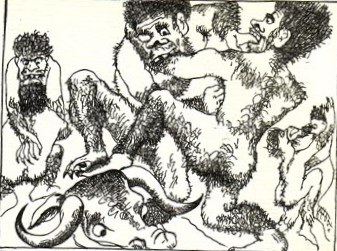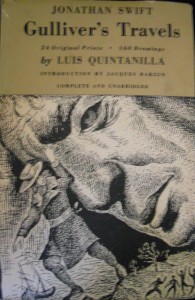UPDATE: Also read David Stabler’s feature on Stephen Marc Beaudoin’s adaptation of “The Beggar’s Opera” in Tuesday’s Oregonian. David digs a little more deeply into the social politics of the adaptation. See his story here on Oregon Live, or with bigger versions of Brian Lee’s rehearsal photos in The O’s dead-tree edition.

ABOVE: William Hogarth, “The Beggar’s Opera,” 1728. Tate Gallery/Wikimedia Commons. INSET BELOW: Scot Crandal (Mack) and Emily Zahniser (Lucy) in Opera Theater Oregon’s “The Beggar’s Opera.” Photo: Katie Taylor, Opera Theater Oregon
“What think you, of a Newgate pastoral among the thieves and whores there?”
Jonathan Swift, casting about for a fresh entertainment for the London stage, made this modest proposal to his friend and fellow satirist Alexander Pope in 1716.
A dozen years later (people took their time in the 18th century) their friend John Gay picked up the idea, turning it from a pastoral into a satire on Italian opera and creating the succes de scandale of 1728, The Beggar’s Opera.
Thieves and whores there were aplenty, plus a clutch of unfortunate impregnations, a few double-crosses, a near-hanging, and a sardonically happy ending. The satire had targets a mile wide, perhaps the broadest being the notable Whig politician Robert Walpole, and the entertainment managed to stay just this side of the censors and the libel courts. It was witty enough in its savagery that many of its targets seemed to take it all as good sport, laughing with the rest of the audience as they were being lampooned.
 Swift and Pope seem good midwives, or perhaps godfathers, for The Beggar’s Opera, which echoes the incisive mockery and shocking entertainment value of Swift’s Gulliver’s Travels and Pope’s The Rape of the Lock. In addition, Gay’s opera had songs — 69 familiar tunes given new lyrics that sometimes, to the delight of London crowds, seemed scooped fresh from the gutter.
Swift and Pope seem good midwives, or perhaps godfathers, for The Beggar’s Opera, which echoes the incisive mockery and shocking entertainment value of Swift’s Gulliver’s Travels and Pope’s The Rape of the Lock. In addition, Gay’s opera had songs — 69 familiar tunes given new lyrics that sometimes, to the delight of London crowds, seemed scooped fresh from the gutter.
And it was topical. The allusions flew as fast and thick as anything on The Daily Show, and often with a lot more bite.
Which is where Stephen Marc Beaudoin comes in.
Beaudoin, a young singer and writer who hit town from Boston a few years ago with a degree from the New England Conservatory of Music and a ton of ambition, promptly stirred up a storm with a string of sometimes scathing performance reviews in Willamette Week, Just Out and The Mercury. To some he was the devil. To others he was the voice of truth.
Either way, he hasn’t played it safe. He also performs in Portland frequently, giving his critics plenty of chances to take their own shots. (He performs well enough that those shots generally misfire.) And starting Thursday, the audaciously hellzapoppin Opera Theater Oregon presents his new, freewheeling version of The Beggar’s Opera, which he has adapted and directed, and which has a new score by Michael Herrman of the band Buoy LaRue. It opens at the Someday Lounge in Old Town and later transfers to The Woods, an old funeral parlor turned music hall in Sellwood.
Continue reading The Beggar’s Opera: Satire for Stumptown →


 “You probably want one of the adaptations,” the clerk said helpfully. “The language is modernized, and they’re a lot easier for kids to read than the original.”
“You probably want one of the adaptations,” the clerk said helpfully. “The language is modernized, and they’re a lot easier for kids to read than the original.”
